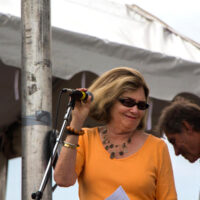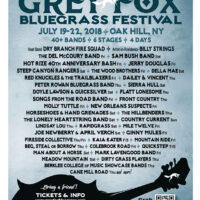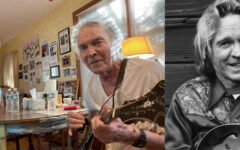
Festival season is in full swing and bluegrass fans are showing up at their favorite festivals or maybe trying out new ones. What makes a great festival? Certainly the musical line-up, stage and sound, campground facilities, jamming, vendors and activities for all family members count in determining where to spend your festival dollars. The owner/promoter’s priorities determine where the emphasis is placed. Can the musical line-up carry the event or do you need workshops, seminar, great jamming and kids entertainment, too?
Grey Fox Bluegrass Festival in Oak Hill, NY (July 19-22) offers all that and more. The “more” comes directly from its owner and promoter Mary Doub. It’s an aura of hospitality that permeates all aspects of the event and has been called “The Grey Fox Way.”
Mary wants people who come to the festival to feel like they’re coming to a party that she’s giving. Everyone is welcomed with a smile. That’s the feeling she tries to instill in the people who help out with the festival.
Katy Daley: You were one of the founding members of IBMA and you were President of the IBMA Board for several years. Your earliest involvement with the music was to manage a band in your hometown of Baltimore and before Grey Fox you worked Winter Hawk. You have a lot of musical business experience. If you were to write a book about running a festival, what advice would you give?
MD: That’s a tough question. My son, who is in venture capital, told me one time that he thought I could have written Management 101. I never read that book but he had and he had just gotten his MBA when he told me that.
I think, like anything else, this is so about people. You have to be so conscience of the way people feel and think.
I do think you want to make sure when you go into this that you understand the costs, you understand what can go wrong, and that you are as capitalized as possible. One of the worst things you can do, like in any business, is to start a festival and be undercapitalized. You have to have a business plan. You have to figure out what you’re going to do when bad things happen. You have to think about things like rain insurance.
This seems so simple but you want to sell as many tickets upfront as you possibly can. I have always had a line of credit so if anything goes wrong, I can always pay the artists. I have heard horror stories of festival promoters who didn’t pay and who kept talking people into playing for them again and again. The artists want to get their music out there and some of them would do that. I think that’s the kind of thing that hurts the music like nothing else. People have to be able to trust you. I believe that’s one thing about Winter Hawk and Grey Fox. People trusted me and they knew that we would pay.
You need a backer. If you can’t get the money yourself you have to find a partner or a backer and present them with your ideas on what you want to do for a festival.
But let me just say this: The one thing you have to concentrate on beyond anything else: Yes, it’s the music. Yes, it’s making the festival run well. You have to put yourself in the place of John Q. Public and you have to think about how that person feels coming through the gate. You want people to feel embraced and cared about. It’s not always fun. You have mud and you have hold-ups, it gets hot and people’s tempers get frayed. If you can get through the first day from when you open the gate at 7:00 a.m. until about 2:00 p.m., then you can get through just about anything else. You have to be thinking hard about the people coming through the gates.
I’m out there in a golf cart watching things to see if I see problems, like people roping off too much area. We have large ‘families’ who have been coming for years – like the Grillbillies, the Flying Pigs, and others. We ask them, if they see newcomers who are looking for a space, take them into your group and help them find a space. We give a prize for the best campsite and it usually goes to the one who’s been the most economical with space. But we want you to figure it out. We don’t want to be in there yelling and screaming with security saying, “you can’t do this or that.” If you can help someone else find a space and get set up, you’ll have a new friend.
KD: So, you need a business plan. You have to have enough money to back those plans. And most importantly, you have to think about all the people – the artists and audience. You must have a massive army of volunteers to help out.
MD: We do and they do a great job. The person who runs the show shouldn’t micromanage. You can’t or you’ll just do a terrible job. Be there for the big decisions, the ones that have to be made by nobody else but you. You need crews and crew chiefs. You need to pay those crew chiefs because you’re asking an awful lot of them. You have to have some staff that you pay. And try to make your volunteers happy. We do feed all our volunteers. I don’t know of a lot of shows that do that anymore, but we do. They also get admission to the festival, camping privileges, and free parking for one vehicle.
I really don’t have to worry about much. We have a wonderful team and they all do their jobs so well. They really do.
KD: Thank you, Mary.









